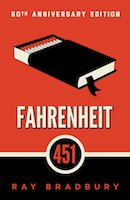 Sarah: I recently saw the new HBO movie adaptation of Fahrenheit 451.
Sarah: I recently saw the new HBO movie adaptation of Fahrenheit 451.
Gene: Starring Michael B. Jordan from Fruitvale Station and Black Panther.
S: It was not great. The ending was updated in a way that I didn’t like.
G: His boss is the bad guy from The Shape of Water, Michael Shannon.
S: He was good. All the performances were good. The changes in the plot were aggravating.
G: Michael B. Jordan plays Guy Montag, right? I recently read someone’s opinion that the book really needed to be updated, that the story needs to be updated. The previous movie was not great.
S: People respond to the story as though it were just about censorship, but Bradbury wrote it about how people have stopped reading because they just want to watch TV. I think that’s absolutely something you can update to the internet era. People don’t want to read long sentences, they want emoji. And that’s how the movie starts. Then there’s book burning, because books bummed people out and caused wars.
G: What bummed people out?
S: Books with sad stories. And religious books cause wars because people disagree about them.
My actual question is this: if you’re in the dystopian future and you have to memorize one book, you’re assigned to memorize one book, how do you go about picking that book? I felt like when Montag met the people who were memorizing books, it looked like they didn’t necessarily get to pick their book. Maybe someone assigned it to them.
G: Oh my god, no!
S: So you’ve got to go in with a strategy or you’re going to end up with a book you don’t like and it’ll be etched into your soul forever. How do you make sure you get a book you can live with for the rest of your life? I liked that the HBO movie updated the books that were being preserved to include more contemporary authors and authors of color…
G: That’s nice.
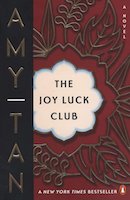
 S: …but it annoyed me that the people who became a book always matched the color of the author. The one Asian-American person had memorized Mao’s Little Red Book. Really?
S: …but it annoyed me that the people who became a book always matched the color of the author. The one Asian-American person had memorized Mao’s Little Red Book. Really?
G: That’s your book? Not an Amy Tan novel or something you’d want to remember?
S: No! Not something that she probably connected with personally. I don’t know. I think 90% of Chinese Americans really don’t like Mao. (laughs) Or at least their parents don’t.
G: I think that’s high, Sarah, I think it’s more like 89%
S: So you, Gene, don’t want to be assigned a guy book just because you’re clearly a guy. You don’t want something based on your demographic background. You want something based on who you are and what book you can live with.
G: That’s the question? How do you do it?
S: How do you go into the room and be like, “I only want prose.” Or “I only want American authors.” Or “I only want books that focus on language rather than character development.”

 G: Maybe in that dystopian future, there are few books to choose from.
G: Maybe in that dystopian future, there are few books to choose from.
S: That’s the problem, knowing how non-librarians collect books in those Little Free Libraries, you’re going to end up with a car manual. You’re going to end up with Jonathan Livingston Seagull.
G: (laughs) Oh my god! The Prophet by Gibran. How to Win Friends and Influence People.
 S: Exactly! I want to go in there and not get whatever bullshit Little Free Library books were saved. Librarians know about collection development, about core collections.
S: Exactly! I want to go in there and not get whatever bullshit Little Free Library books were saved. Librarians know about collection development, about core collections.
G: But it couldn’t be a graphic novel.
S: Yeah, or you’d have to act it out.
G: Could it be a picture book? It’d easier to memorize prose. That’s maybe the wrong idea, maybe there’s a way to transmit pictures in a graphic novel. I immediately go to prose, I go to short. I think plays would be easier to memorize.
S: Do you think that’s why that lady chose Mao’s book? “What’s the shortest one you have?”
G: And it’s historic, right? But I think most people would preserve a bestseller…
S: Yes.
G: Every Dean Koontz book would come down through the ages..
S: By sheer numbers…and Stephen King.
G: Stephen King, The Bible, Harry Potter.
 S: Harry Potter shows up on the screen in Fahrenheit 451.
S: Harry Potter shows up on the screen in Fahrenheit 451.
G: Could you do it if you didn’t have a choice? I think yes. Because you’re going to get stuck with one book, and you’re desperate to read something anyway.
S: Assume you get to go through the process of memorizing, it’s not just accidental. What do you want to stare at, for as many years of your life as you need to memorize that book?
 G: What would I want? I would pick a story that I really like and I would pick a kids’ book. I would pick some
G: What would I want? I would pick a story that I really like and I would pick a kids’ book. I would pick some  Lloyd Alexander book, probably The Book of Three or The Black Cauldron or The High King. (I recognize that Taran Wanderer isn’t the best standalone book in the Prydain series though it’s still my personal favorite.) I’d pick one of those, or my favorite book, LeGuin’s The Wizard of Earthsea. I could memorize the first three books in that series, I think.
Lloyd Alexander book, probably The Book of Three or The Black Cauldron or The High King. (I recognize that Taran Wanderer isn’t the best standalone book in the Prydain series though it’s still my personal favorite.) I’d pick one of those, or my favorite book, LeGuin’s The Wizard of Earthsea. I could memorize the first three books in that series, I think.
 S: Yeah. They might be happy if you volunteered to do three. “I’ll
S: Yeah. They might be happy if you volunteered to do three. “I’ll  do three if I can do these three.”
do three if I can do these three.”
G: But how do you resolve the fights? “No no no, I’M The Wizard of Earthsea!”
S: Trial by combat!
G: Have a throwdown? Maybe a bunch of people are sitting around reading a copy of John Grisham’s The Client to each other.
S: That’s what I’m afraid of. I don’t want to walk into the room and get The Client.

 G: You have to have some redundancy, though, right?
G: You have to have some redundancy, though, right?
S: Yeah, what if somebody gets set on fire, as happens in the film?
G: Are they setting people on fire?
S: One person immolates herself as a political protest, I think simultaneously eliminating The Grapes of Wrath by Steinbeck.
G: I remember in high school skipping every other chapter of that book because they 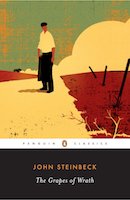 were the allegorical chapters. The chapters about the Joads were interesting and readable, though. All I remember is the end, where the woman is breastfeeding an old man who’s dying. And everyone in class was like, “Whaaaaaat?”
were the allegorical chapters. The chapters about the Joads were interesting and readable, though. All I remember is the end, where the woman is breastfeeding an old man who’s dying. And everyone in class was like, “Whaaaaaat?”
S: If you are that book, say, “Calm down. Don’t flip out over this next chapter.”
 G: Maybe I’d want to be Between A Rock and A Hard Place by Aron Ralston, the book about the guy who got his hand trapped while hiking and climbing in Utah alone.
G: Maybe I’d want to be Between A Rock and A Hard Place by Aron Ralston, the book about the guy who got his hand trapped while hiking and climbing in Utah alone.
S: Ooh, yeah, a gripping true adventure story.
G: Of course there’s be some guy who’d want a Highlander movie novelization. What would you do?
S: See, I should have an awesome answer, since I had a while to think about it…
G: You have two seconds!
 S: (blurts quickly) The Areas of My Expertise by John Hodgman!
S: (blurts quickly) The Areas of My Expertise by John Hodgman!
G: See, that wasn’t so bad. It’s a funny book.
S: It’s a funny book, it’s in little bits and pieces, you can read it in any order, you can jump around and memorize little bits at a time. Maybe I’d even do the whole trilogy.
G: Can you imagine a library where everyone its the service area got to choose just one book for the collection? And there was nothing else there?
Tag: fiction
Starting Middle School
Sarah: A friend of mine, her daughter is going to middle school next year. The school she goes to now has a lot of kids who have been protected from the bumps and bruises of life. The don’t have testing, they don’t have grades. It feels very accepting and hippie-ish, but they get to use computers.
Gene: I have some friends whose kids went to a school like that, and they didn’t end up too crazy.
S: It’s interesting, some of them go to similarly special middle schools, and some of them go to the regular middle schools, which can be a bit of a change.
G: Kids with chains and filed-down teeth waiting for them at the door.
S: Waiting to suck their blood.
So my friend gets a letter from the school about how to help her help her daughter to adjust to the changes in going to a new school. The whole thing is about how it’s hard, and it’s harder when they’re going through puberty and social changes, and starting to argue with their parents and having their own sense of what their lives should be. They’re no longer your cute perfect darling children. It can be hard. But it doesn’t approach it as though it’s normal (which it is) and that every parent goes through this (which they do), it’s more like, “This is the upcoming tsunami that’s going to hit your home, you may be concerned. Here’s how to ensure they don’t become dead-eyed drug addicts.”
G: I think I got a letter like this, too, years ago.
S: At the end of the letter, there is a list, Great Books About — and this is actually in quotations — “Middle School.”
G: (laughs) Because we’re not really talking about middle school?
S: I have no idea. There are four fiction and three nonfiction books. The nonfiction books are fairly well-chosen. There’s some recent ones and some older ones that are pretty good.
G: Does it mention using a short-wave radio to call for help?
S: Right, no, it’s not quite that bad. The fiction books, though… my friend, who has an MLIS, who makes booklists herself, was dismayed that they were so old. Old enough that two weren’t in the public library anymore, one was available only as an ebook rerelease, one that’s just old and there are only two copies available.
G: Maybe it’s a cry for help from whoever made that list. Maybe the list had to be district-approved.
S: Exactly. I feel the same frustration with lists people get from their doctors after a diagnosis. The books are all ten or fifteen years old and the library system only has one copy left, with a long, long waiting list. I want to write back to the doctors with a list of ten newer books and tell them to pick the ones they like.
G: You should do that for the school.
S: My friend asked me to make her a list she could share with the other parents.
G: That’s great! You’re living the librarian’s dream!
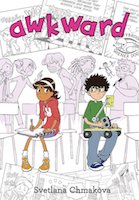
 S: But 99% of my booklist is graphic novels, because that’s what I read. So I wanted to ask if you had some recommendations. Here’s what I have so far:
S: But 99% of my booklist is graphic novels, because that’s what I read. So I wanted to ask if you had some recommendations. Here’s what I have so far:
Awkward and Brave
G: I really liked Brave.
S: Drama.
G: How old is the main character in Drama?

 S: I had thought she was in high school, but the synopsis said middle school.
S: I had thought she was in high school, but the synopsis said middle school.
Jedi Academy.
G: Timeless.
S: All’s Faire in Middle School.
G: Liked it, but maybe a limited audience.
S: I added this because I like the author and it had a lot of positive reviews, Planet Middle School. It’s poems about a girl making the shift into middle school, trying out new 
 ways of being more grown up. And these two, which are constantly being requested by kids, The Strange Case of the Origami Yoda and Dork Diaries.
ways of being more grown up. And these two, which are constantly being requested by kids, The Strange Case of the Origami Yoda and Dork Diaries.
G: Are those middle school?
S: As far as I can tell, yes. Though it’s tough to say sometimes, when the summary describes the characters as being in sixth grade. That could be elementary or middle school. My friend does know me, and would not be 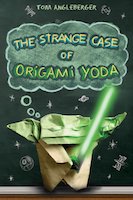
 surprised if I gave her a list full of graphic novels, but if you can think of any others. There’s those James Patterson middle school comedy novels that seem to be really popular…
surprised if I gave her a list full of graphic novels, but if you can think of any others. There’s those James Patterson middle school comedy novels that seem to be really popular…
G: I don’t read this age very much.
S: …and I don’t know if they’re positive hopeful you-can-do-it kind of books about 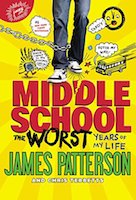
 middle school. Because you don’t necessarily want to give them the books where it looks like everyone gets teased.
middle school. Because you don’t necessarily want to give them the books where it looks like everyone gets teased.
G: I haven’t read this series, but I’ve heard they’re good: Positively Izzy. And Roller Girl is solidly middle school, about finding your way.
S: But it’s a summer story more than a school story.

 G: But it’s a friend story. Real Friends is good, too
G: But it’s a friend story. Real Friends is good, too
S: But that’s elementary, right?
G: Is it?
S: I seem to think it was pretty young.
G: I can’t remember how old the kids are in the Sunny Books, but Swing It Sunny is middle school. And there’s now a middle school Babymouse book.
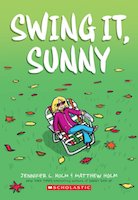
 S: I think I should ask a children’s librarian, too, because kids in late elementary grades are the ones who are curious about starting middle school. The kids in middle school are thinking about other things, because they’re there already. Which is why I thought of Drama, because it’s not about starting middle school, it’s about being in it.
S: I think I should ask a children’s librarian, too, because kids in late elementary grades are the ones who are curious about starting middle school. The kids in middle school are thinking about other things, because they’re there already. Which is why I thought of Drama, because it’s not about starting middle school, it’s about being in it.
G: Yeah, I would never booktalk a book about starting middle school in a middle school.
S: Right. My friend thought that clearly the expert would be the teen librarian, but apparently not.
G: Ask us about the transition to high school. The indirect stories, anyway. The direct how-tos are for parents.
S: I want to have the parents read these graphic novels. I want to say, “Hey, it’s not that bad. Everything seems horrible to them because that’s their bodies and their brains going through big changes. Everything seems intense because it’s all new. But people survive this. Kids survive this every day. You’ll survive it. It’s going to be obnoxious, but you’ll survive it.”
I know what I read last summer
In the air and on the ground in South Korea and Vietnam I made it through three book books in a month. That’s a lot for me. My secret: I read slowly. Must be why I like graphic novels so much.
Red Sparrow by Jason Matthews. Pocket Books, 2013. 9781501168918. 576pp.
 A personal recommendation by the owner of Seattle’s BLMF bookstore who said something like, “This got me reading spy fiction again.” This is indeed a great book that doesn’t center on the character in the movie trailer seducing everyone after going to sex/assassination school (though Dominika Egorova does to to that school). The book starts with a young CIA operative in Moscow (Nathaniel Nash) nearly getting caught as he goes out to meet a high level Russian double agent, then alternates telling the stories of Nash and Egorova as it brings each into the other’s orbit. The less said about the plot the better, but the characters are scary brilliant at every turn, and the situations they face will have your heart pounding.
A personal recommendation by the owner of Seattle’s BLMF bookstore who said something like, “This got me reading spy fiction again.” This is indeed a great book that doesn’t center on the character in the movie trailer seducing everyone after going to sex/assassination school (though Dominika Egorova does to to that school). The book starts with a young CIA operative in Moscow (Nathaniel Nash) nearly getting caught as he goes out to meet a high level Russian double agent, then alternates telling the stories of Nash and Egorova as it brings each into the other’s orbit. The less said about the plot the better, but the characters are scary brilliant at every turn, and the situations they face will have your heart pounding.
Record of a Spaceborn Few by Becky Chambers. July, 2018. 9780062699220. 368pp.
 Chambers is writing the most upbeat, character centered science fiction that I’ve read. Plot seems secondary to people in an absolutely brilliant way in the Wayfarer series, which started with The Long Way to a Small Angry Planet. (You don’t need to have read it first, but there are some references to it in this one.)
Chambers is writing the most upbeat, character centered science fiction that I’ve read. Plot seems secondary to people in an absolutely brilliant way in the Wayfarer series, which started with The Long Way to a Small Angry Planet. (You don’t need to have read it first, but there are some references to it in this one.)
This book revolves around life in the Exodan Fleet, the ships in which humanity left the Earth behind centuries ago as it set out for the stars. To members of a Galactic Federation, the Exodans’ way of life and level of technology are very backward, though to some their communal way of life is fascinating. The story is told from several points of view — young people who want to head planetside as soon as they’re able, a young man who grew up on the ground but has come to the fleet to try their way of life, an archivist in the fleet, a person who prepares bodies for recycling and handles funerary rites, and an alien who has come to study and report on Exodan society. The insects they eat sound delicious, and I’d go visit in a moment if this was a real place — not many books make me smile as often and unexpectedly as Chambers’ do.
The Crippler: Cage Fighting and My Life on the Edge by Chris Leben and Daniel J. Patinkin. Skyhorse, 2017. 9781510727731. 296pp.
 I was a huge fan of Leben’s bloody slugfests in the UFC — he was tough and often seemed to keep fighting on pure heart. Reading about how tough his early life was and how he abused his body before and during his time as a pro fighter was a bit horrifying, but about halfway through the book I checked his Facebook page and saw photos of a smiling Leben in Hawaii with his family, and that pulled me through.
I was a huge fan of Leben’s bloody slugfests in the UFC — he was tough and often seemed to keep fighting on pure heart. Reading about how tough his early life was and how he abused his body before and during his time as a pro fighter was a bit horrifying, but about halfway through the book I checked his Facebook page and saw photos of a smiling Leben in Hawaii with his family, and that pulled me through.
The only other MMA bio that I’ve read is strategist/fighter Georges St-Pierre’s The Way of the Fight, whose “this is how I became who I am” book stands in stark contrast to Leben’s “I can’t believe I made it through this” stories. Maybe the contrast means they should be read together?
Imperfect Little Parents
Perfect Little World by Kevin Wilson. Ecco, 2017. 9780062450340. 352 pp.
 Gene: I read Wilson’s The Family Fang and I loved it. It’s also about an unusual family.
Gene: I read Wilson’s The Family Fang and I loved it. It’s also about an unusual family.
Sarah: I hadn’t heard of it. Then I mentioned this book to Tom and he said they’d made a movie out of The Family Fang.
G: No!
S: It came out in 2016. It has Jason Bateman in it.
G: (Adding it to his watchlist) It’s about a family that does public performance art pieces that people don’t know are performance art, some of which involve their kids. Very funny. You should read it. And that made me want to read this, not even knowing what it was about.
S: I wanted to introduce this by saying that when I was in elementary school and we had reading time in our class, we had to read stories from a big stupid textbook. It had stories and parts of books, but not the good parts. And one of the comprehension questions was always: “Why do you think the author wrote this story?” We were clueless kids. “To get paid!” I think it was an easy way to ask us about the theme of a book. (Now, as an adult, I’m like, it wasn’t to get paid.)
That was on my mind when I was reading this because I wasn’t sure what the theme was until I was most of the way through. I liked it, but I wasn’t sure what it was about.
G: There were moments in the middle where I was really enjoying it and I didn’t feel like there was a huge conflict. I just liked Izzy so much.
S: So, the premise.
Continue reading “Imperfect Little Parents”
Last But Not You Know
The Penderwicks At Last by Jeanne Birdsall. Knopf Books for Young Readers, 2018. 9780385755665. 304pp.
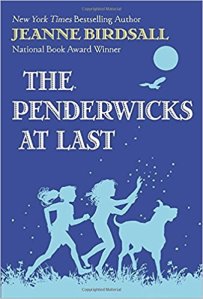 When I’m not reading comics, I favor dark mysteries, science fiction on an epic scale, and heroic fantasy so violent that I can’t recommend it to many. And when I’m looking for books that meet these tastes, I seek out recommendations from folks who read widely in these genres. (“I read 300 fantasy novels a year and this was the best.”) But when I’m looking for books outside them, I want to find the books people read kind of in spite of how they can be easily described. (“I don’t like literary fiction, but I couldn’t put this down.”)
When I’m not reading comics, I favor dark mysteries, science fiction on an epic scale, and heroic fantasy so violent that I can’t recommend it to many. And when I’m looking for books that meet these tastes, I seek out recommendations from folks who read widely in these genres. (“I read 300 fantasy novels a year and this was the best.”) But when I’m looking for books outside them, I want to find the books people read kind of in spite of how they can be easily described. (“I don’t like literary fiction, but I couldn’t put this down.”)
Well, I don’t read many kids chapter books, or books that paint a rosy picture of family life and childhood. But this is one of those, and it’s the book I most anticipated reading this year. It’s the fifth book in the Penderwicks series, so minor spoilers ahead. Take it from an atypical recommender — start at the beginning and don’t stop until you’ve read them all.
This one focuses on Lydia, the youngest Penderwick sister. Her oldest sister Rosalind is getting married, and decides to have the ceremony at Arundel, the setting for the first book (where the four original Penderwick girls met now honorary Penderwick Jeffrey, who lived there with his mother, Mrs. Tifton, and her horrid then current husband). (Sorry for the long sentence. There’s just so much context here.) Lydia heads to Arundel early with Batty (now a young adult, still a singer), to start cleaning the place, and soon Jane (waitressing while working on her books) arrives to start making the dresses. It’s a great excuse to get everyone together, and to see them through young Lydia’s eyes as she explores Arundel (and the stories she’s heard about it) with her new friend, Alice. There’s lots in here about dealing with the pair’s annoying beloved older brothers, plus Mrs. Tifton is around, still intimidating and unpleasant to kids, still worried that her beloved Jeffrey (who now owns Arundel) is going to get sucked into marrying one of the Penderwicks.
This book contains more amazing dogs than have ever existed in my cat-centric world, plus one cool sheep. Give it to everyone you know, even the cat people.
Got milk?
Confessions: a novel by Kanae Minato. Translated by Stephen Snyder. Mullholland Books (Little, Brown), 2014. 9780316200929. 234pp.
 I’m going to try (and fail) to pitch this Japanese novel as well as Wes at Third Place Books pitched it to me.
I’m going to try (and fail) to pitch this Japanese novel as well as Wes at Third Place Books pitched it to me.
It opens with a middle school teacher, Yuko Moriguchi, talking to her students. Her daughter, Manami, drowned in the school’s pool during a staff meeting, devastating her and the girl’s father. But it was not an accident. Her daughter was killed by two students, and the teacher knows exactly who they are. She talks about them in detail, and though she doesn’t use their names everyone listening can easily identify them. And then Moriguchi explains her revenge — she’s poisoning their milk with HIV+ blood.
That’s dark enough already, but it gets darker. The next four chapters, each narrated by a different character connected to Manami’s murder, explore the murderers’ lives before and after the killing, and show what happens because of their actions and Moriguchi’s revenge. It’s all wonderfully horrific. (I hear there’s a movie. I can’t wait to see it.)
Gene & Sarah
George and Lizzie by Nancy Pearl. Touchstone, 2017. 9781501162893. 288 pp.
 Gene: This is George and Lizzy by Nancy Pearl.
Gene: This is George and Lizzy by Nancy Pearl.
Sarah: Who we’ve both met and both like.
G: Who I would say is a buddy of mine.
S: I own her action figure and the T-shirt that you made of her.
G: She’s awesome. I ran into her husband at my local library in September — they live close to me — when Nancy was on her book launch tour. He teaches a meditation class I need to take.
S: I feel like the few things I know about her I noticed reflected in the book, and there are probably going to be more, and the meditation class is one of them.
G: Oh my god, I didn’t think about that. So, give me your pitch for this.
S: Lizzie, when she was in high school, well her friend came up with this idea that she thought was great…her friend dropped out because this idea was insane but Lizzie did it anyway.
G: What was the idea?
S: To sleep with every member of the high school football team. Well, not every member, but the starters. And they were going to divide the starters between them, which was 11 boys each, and then they’d flip for the last one…
G: The kicker.
S: …but because her friend dropped out Lizzie decided she would do all the starters. And it’s never totally clear why she does this except she’s super pissed off at her parents and maybe kind of hopes this will shock them into caring about her.
Continue reading “Gene & Sarah”
Stop Me If You’ve Heard This One
Challenger Deep by Neal Shusterman, illustrations by Brendan Shusterman. HarperCollins, 2015. 9780061134111.
 As a book blogger, I hope I can bring you some value in my writing: helping you find a hidden gem or highlighting the best new stuff. So it feels weird to write about a book you probably already know is really good. The book, published three years ago, is widely-acclaimed, by a well-loved YA author, and won the National Book Award. It’s not new and it’s not hidden, but it is a gem. Challenger Deep ended up on my phone when I was taking screenshots of my library’s eBook platform for a presentation and needed to borrow a book. Before I knew it I was completely sucked in.
As a book blogger, I hope I can bring you some value in my writing: helping you find a hidden gem or highlighting the best new stuff. So it feels weird to write about a book you probably already know is really good. The book, published three years ago, is widely-acclaimed, by a well-loved YA author, and won the National Book Award. It’s not new and it’s not hidden, but it is a gem. Challenger Deep ended up on my phone when I was taking screenshots of my library’s eBook platform for a presentation and needed to borrow a book. Before I knew it I was completely sucked in.
The chapters are short and propel you along quickly through two parallel stories. In one, fifteen-year-old Caden is beginning to suspect something might be wrong, but he can’t articulate what or why to his family. Strange ideas keep nagging at him, he feels connected in some profound way to everyone and everything, and he’s afraid that a kid at school wants to kill him. These thoughts become more persistent, the illusions and emotions become more heightened, and he develops physical symptoms: his artwork becomes abstract and uncontrolled (the art in the book is drawn by the author’s son, who is the inspiration for the book), he walks for hours and hours every day, and he never wants to eat. In the other story Caden is aboard a pirate ship crewed by teens with similar problems. Reality warps from moment to moment and analogy, metaphor, and even puns become real as the ship heads for the depths of the Marianas Trench.
The spoiler/not spoiler (the information is on the book jacket and in every review) is that Caden is struggling through the onset of schizophrenia. The chapters on the ship explore his experience through metaphor and may be the reality that Caden is living at his lowest points. The chapters set in real life show Caden’s perspective as he copes as best he can while his friends and family are frightened and bewildered by the changes in his behavior. The chapters begin to overlap as Caden responds to treatment, and the “real life” chapters show him regaining his perspective and sense of humor. My favorite character was the ship’s figurehead/fellow patient who forms a deep connection with Caden and gives him advice about his future. As Caden himself points out, people’s experiences with schizophrenia and its treatment are very individual: this is only one story and can only really show one experience. But I think it’s invaluable for humanizing this experience.
8-Bit Nostalgia
Impossible Fortress: A Novel by Jason Rekulak. Simon & Schuster, 2017. 9781501144417.
 Sarah: So do you find yourself wondering if a book is intended to be an adult or teen book and then judging it differently?
Sarah: So do you find yourself wondering if a book is intended to be an adult or teen book and then judging it differently?
Gene: Yeah.
S: I think I would have been harsher to this book if it had been a teen book.
G: Isn’t it a teen book?
S: It is not a teen book.
G: I read it like it was a teen book.
S: I read it as an adult book, so I was a little bit more forgiving of the fact that it meandered.
G: But it’s clearly a teen novel. It just relies so heavily on nostalgia that you can’t put it on the teen shelf. It’s much more for us.
Continue reading “8-Bit Nostalgia”
Mom Rom Com
Colonial Madness by Jo Whittemore. Aladdin, 2015. 9781481405089. Also published as Me & Mom vs. The World.
 When I booktalk to middle school classrooms, I like to bring at least one squeaky-clean book for the kids who need one. (And as a palate-cleanser for all of the books about skeletons and bizarre animals that I bring.) Colonial Madness was a perfect fit. The plot is light and cute: an eccentric aunt has decided that her huge historic house will go to the relative who can best live like a colonial settler in an heir-on-heir reality-show-style competition. Throw in a cute boy (the son of the house’s caretakers) and you’ve got a screwball family romantic comedy. Tori and her mom, competing as a team to save her mom’s dress shop, have a warm and close relationship, even if mom is often silly and impractical. How so? She and Tori once made a massive ice cream sundae in the bathtub, played hide and seek in a graveyard, and decided to see how many stuffed animals they could velcro to their bodies. Tori loves her mom a lot, but still gets mad at her and hurts her feelings. And it’s all presented in a way that I think would be very reassuring to a kid, especially to one who doesn’t want to read anything mom might think is inappropriate.
When I booktalk to middle school classrooms, I like to bring at least one squeaky-clean book for the kids who need one. (And as a palate-cleanser for all of the books about skeletons and bizarre animals that I bring.) Colonial Madness was a perfect fit. The plot is light and cute: an eccentric aunt has decided that her huge historic house will go to the relative who can best live like a colonial settler in an heir-on-heir reality-show-style competition. Throw in a cute boy (the son of the house’s caretakers) and you’ve got a screwball family romantic comedy. Tori and her mom, competing as a team to save her mom’s dress shop, have a warm and close relationship, even if mom is often silly and impractical. How so? She and Tori once made a massive ice cream sundae in the bathtub, played hide and seek in a graveyard, and decided to see how many stuffed animals they could velcro to their bodies. Tori loves her mom a lot, but still gets mad at her and hurts her feelings. And it’s all presented in a way that I think would be very reassuring to a kid, especially to one who doesn’t want to read anything mom might think is inappropriate.